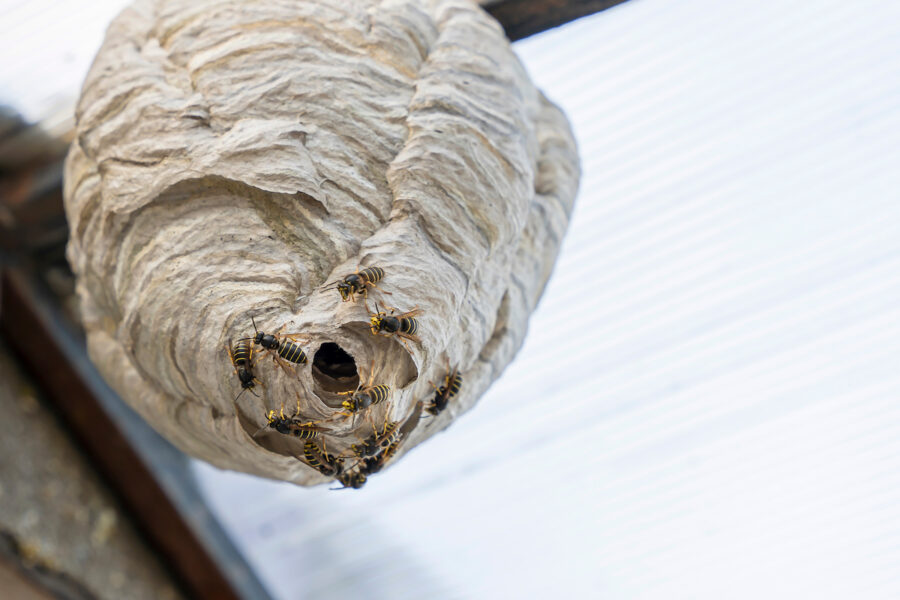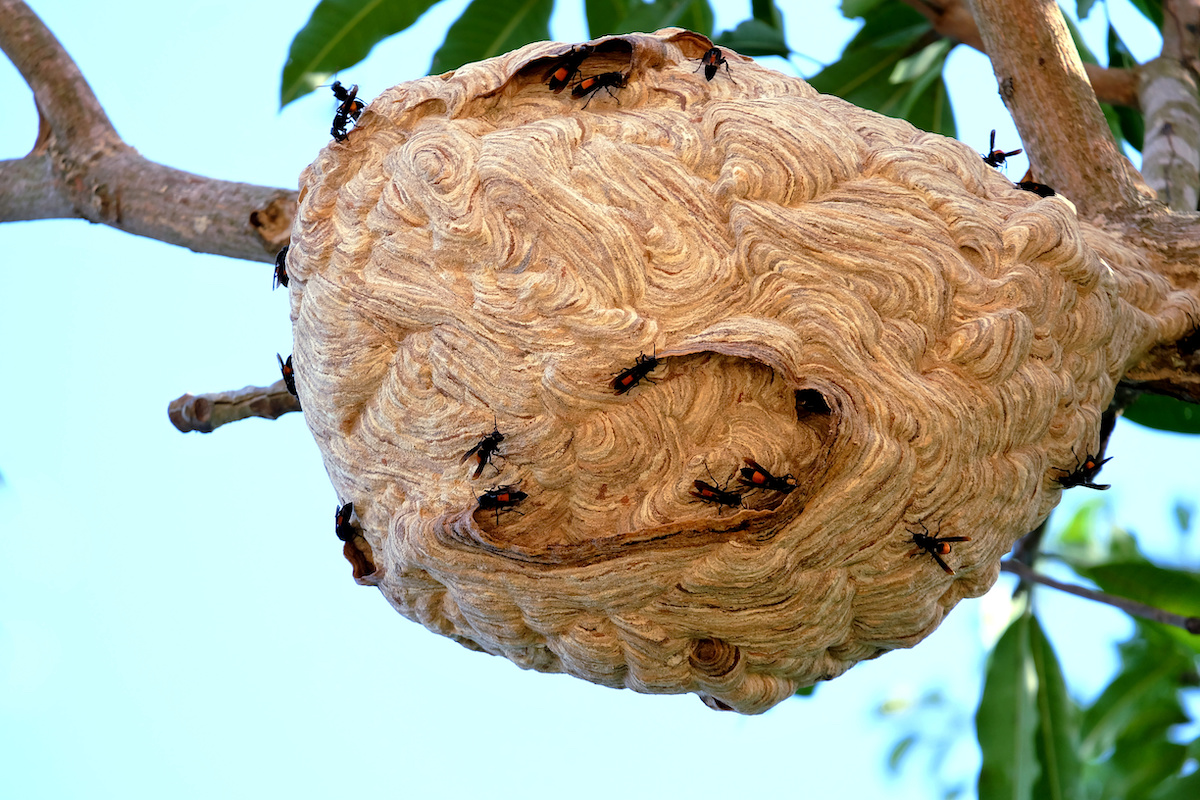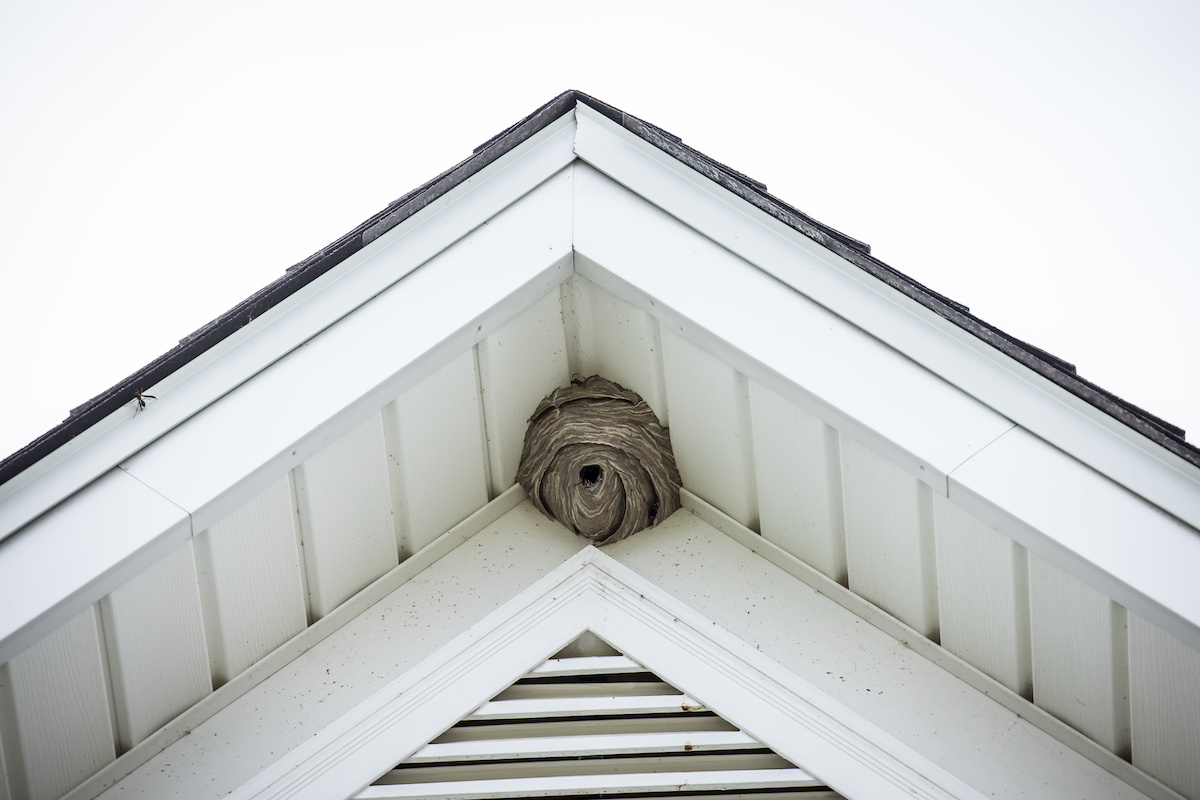
Wasp and hornet infestations can pose significant challenges for commercial properties, ranging from safety concerns for employees and customers to potential damage to structures and property. Effective control and management of these stinging insects are essential for maintaining a safe and comfortable environment for everyone on the premises.
In this article, we’ll explore practical tips and strategies for controlling and preventing wasp and hornet infestations in commercial settings.
Consequences of a Wasp and Hornet Infestation at Your Business
Not addressing a wasp or hornet infestation at a commercial property can pose several risks and challenges:
Safety Concerns
Wasps and hornets are aggressive when defending their nests. Their stings can cause painful reactions and, in some cases, severe allergic reactions in individuals who are sensitive to their venom. This poses a safety risk to employees, customers, and visitors on the premises, especially those who may inadvertently disturb a nest.
Negative Impact on Reputation
The presence of wasps or hornets in and around a commercial property can create a negative impression on customers and visitors. It may give the perception of poor maintenance or cleanliness standards, which can damage the reputation of the business.
Negative reviews or word-of-mouth experiences regarding pest issues can deter potential customers and affect the overall success of the business.
Potential Legal Issues
Failure to address pest infestations, including wasps and hornets, may result in legal consequences for commercial property owners. Local health and safety regulations may require businesses to maintain a pest-free environment for employees and customers. Ignoring or neglecting pest control measures could lead to:
- Fines
- Penalties
- Legal action against the business
Structural Damage
Wasps and hornets often build their nests in or around structures, including building eaves, attics, and walls. Their nesting activities can result in structural damage over time, as they chew through wood and other materials to create and expand their nests. This damage can compromise the integrity of the building and lead to costly repairs and maintenance expenses.
Disruption of Business Operations
An infestation of wasps or hornets can disrupt normal business operations, causing inconvenience and potential financial losses. Employees may be reluctant to work in areas with high pest activity, and customers may avoid visiting the premises altogether. This disruption can impact:
- Productivity
- Sales
- Overall business performance

Identifying Common Wasp and Hornet Species
Identifying common wasp and hornet species is crucial for effective pest management on commercial properties. Here are some key characteristics of common species:
- Yellow Jackets: Yellow jackets are among the most aggressive and common types of wasps found in commercial settings. They have distinct yellow and black markings, slender bodies, and narrow waists. Yellow jackets typically build nests in underground burrows, wall voids, or enclosed spaces such as attics and crawl spaces.
- Baldfaced Hornets: Baldfaced hornets are large, black-colored insects with white markings on their faces and abdomens. They construct large, paper-like nests that resemble gray footballs and hang from trees, bushes, or building eaves. Baldfaced hornets are known for their aggressive defense of their nests and can deliver painful stings.
- European Hornets: European hornets are relatively large insects with brown and yellow markings on their bodies. They build large, spherical nests usually located in hollow trees, wall voids, or attics. While European hornets are less aggressive compared to other species, they can still sting when provoked, posing a threat to individuals in close proximity to their nests.
- Paper Wasps: Paper wasps are slender-bodied insects with long legs and narrow waists. They are often brownish-red or black in color and construct small, open-faced nests made of paper-like material. Paper wasp nests are typically attached to eaves, branches, or other structures. Although less aggressive than some other species, paper wasps will defend their nests if disturbed.
- Cicada Killers: While not true hornets or social wasps, cicada killers are solitary wasps that can be mistaken for hornets due to their large size and coloration. These wasps are often black with yellow markings and can grow up to two inches in length. Cicada killers are not typically aggressive towards humans but can be intimidating due to their size.
By familiarizing yourself with the characteristics and behaviors of these common wasp and hornet species, you can better identify and address infestations on your commercial property, leading to more effective pest control measures and a safer environment for employees and customers.
Tips for Commercial Wasp and Hornet Control
Conduct Regular Inspections
Regular inspections of the property are essential for early detection of wasp and hornet activity. Inspect outdoor areas such as eaves, overhangs, gutters, and landscaping features where nests may be concealed. Indoor areas such as storage rooms, warehouses, and utility spaces should also be inspected for signs of nesting activity.
Implement Preventative Measures
Preventative measures play a crucial role in reducing the likelihood of wasp and hornet infestations on commercial properties. To prevent pests from gaining access to the building, seal potential entry points such as gaps in:
- Exterior walls
- Windows
- Doors
Keep outdoor dining areas clean and free of food debris to minimize attractants for foraging wasps and hornets.
Remove Food Sources
Wasps and hornets like garbage bins, dumpsters, and outdoor dining areas because they are viable food sources.
Implementing a strict sanitation protocol ensures that food waste is properly disposed of and that trash receptacles are tightly sealed. Regularly empty and clean garbage bins to eliminate odors that may attract pests.
Utilize Traps and Baits
Traps and baits can be effective tools for controlling wasp and hornet populations on commercial properties. Place bait stations strategically around the property, focusing on areas with high pest activity. You can also use commercially available traps to capture wasps and hornets outdoors without the need for chemical pesticides.
Seek Professional Pest Control Services
In severe infestation cases or for properties with complex pest control needs, seek the assistance of a professional pest control provider. Experienced technicians can:
- Conduct thorough inspections
- Develop customized treatment plans
- Implement control measures using safe and effective methods
Additionally, they can provide ongoing monitoring and maintenance to ensure long-term pest management success.
James River Pest Solutions: Your Trusted Partner in Wasp and Hornet Control
James River Pest Control specializes in comprehensive pest management solutions, including effective wasp and hornet control services. Here’s how our expertise can assist you:
- Professional Inspection: Our trained technicians conduct thorough inspections of your commercial property to identify active wasp and hornet nests, as well as potential nesting sites. By pinpointing the source of the infestation, we can develop targeted treatment strategies to address the problem efficiently.
- Customized Treatment Plans: We tailor our wasp and hornet control solutions to suit the unique needs of your commercial property. Depending on the severity of the infestation and the species involved, we may employ a variety of methods, including insecticide applications, nest removal, and exclusion techniques to prevent future infestations.
- Safe and Effective Techniques: Our team utilizes safe and environmentally friendly pest control products and techniques to eliminate wasps and hornets while minimizing risks to human health and the environment. We prioritize the safety of your employees, customers, and the surrounding ecosystem in all our pest control efforts.
- Preventive Measures: In addition to addressing existing infestations, we help implement preventive measures to deter future wasp and hornet activity on your property. This may include sealing entry points, installing deterrents, and providing recommendations for landscaping and maintenance practices that discourage nesting.
- Ongoing Monitoring and Maintenance: We offer ongoing monitoring and maintenance services to ensure long-term effectiveness and peace of mind. Our team will periodically inspect your property for signs of wasp and hornet activity and implement proactive measures to prevent reinfestation.
With James River Pest Control’s professional expertise and commitment to quality service, you can trust us to effectively manage and control wasp and hornet infestations on your commercial property, creating a safer and more enjoyable environment for your employees and customers.

Rely on Professional Wasp and Hornet Control for Your Commercial Properties
Effective wasp and hornet control is essential for maintaining a safe and pest-free environment in commercial properties. By implementing proactive measures, conducting regular inspections, and seeking professional assistance when needed, businesses can effectively manage wasp and hornet infestations and protect the health and safety of employees, customers, and visitors.
If you’re searching for professional wasp and hornet control, reach out to our team at James River Pest Solutions!